- Home
- Margaret Brownley
Four Weddings and a Kiss Page 7
Four Weddings and a Kiss Read online
Page 7
Maizy stayed back. “Give it a try. You may not need my help.”
“I will always need you, Maizy, and not just because I need your hard work.” They were looking right at each other. Her kneeling, him sitting. Then he smiled. “Don’t wander off.”
He was the best-looking man Maizy had ever imagined.
With decent agility he scooted on his backside up the stairs. Then, using his left leg, he did a fair job of getting to his feet.
Once he was standing, he reached out one hand. After a long hesitation, she took it, not at all sure that was wise.
“Maizy . . .” Rylan rubbed the back of his neck with his free hand and frowned at the toes of his boots as if he thought the words he wanted to speak might be written on them.
She waited. It was a fine thing to respect her and want her in his life as she was . . . if he did. But he still hadn’t said the one thing that would make her risk everything. And Maizy suspected he never would.
Finally he raised his head, and his eyes blazed with a fire she didn’t understand. “You want to know why I said those things to you the first time I saw you wearing britches?”
She wasn’t sure she did.
“I’d been in the country two weeks. I’d just spent every penny I had and borrowed a bunch I shouldn’t have to make a go of raising Angus cattle. I knew I had years of hard work to prove myself to my pa. One look at you and I wanted to forget all of that.”
“What?” Whatever she’d expected him to say, it hadn’t been this.
“One look at you in those blasted britches and I wanted you more than I wanted my ranch and my cattle and my pa’s respect. And I’ve been trying to stay away from you ever since. I kept thinking when things were good and I knew I’d made it, then I could think on things like a wife. But then, after I got hurt and it looked like I’d lose everything . . .” He shook his head. “I’ve been trying to get you to go away so when I disgrace myself and lose my ranch, I won’t drag you down with me.”
“Rylan, you’re not going to lose the ranch. We’ll get the cattle ready on time.”
“You mean you will. You’re saving me, Maizy.” Rylan reached out and took her other hand. “Maybe not being able to do it on my own should pinch my pride—the good Lord knows I’ve got too much of that. But right now all I can think is, I’ve been a fool not to accept the gift God put right in front of me. And I’ve shown myself to be a fool in about every way a man can.”
Maizy probably should have protested, but there was too much truth in what he was saying. For all his words, though, he still hadn’t said what she needed to hear.
“I should have grabbed you the first time I saw you riding in your pa’s corral, pretty Maizy. I should have known that minute that I’d just met the love of my life.”
And there, he’d just said it.
“That’s what I realized when you slammed that door. Up until then I was acting out of pride and fear and anger, all made worse by pain from my injuries. But when I realized you might be leaving me for good, well, I knew I didn’t want you to stay for dressing a certain way or working a certain way. I want you to stay because I love you. I love the woman who has worked tirelessly, inside and out, to save my ranch for me, to care for me. But more than that, I want you to stay because I believe you’re the woman God prepared for me, from the moment of my birth. And from this moment on, I’m going to try and be a man who is worthy of you. I’m so sorry for the way I’ve acted, and I think if I stop trying to push you away, a lot of the trouble . . . my . . . behavior . . . my . . .”
“Insulting, rude, obnoxious, low-down—”
Rylan put one hand gently over her mouth. “Yes, all that and more. That’s all because I was trying not to do this.” He pulled her into his arms and kissed the living daylights out of her.
When he finally let her go, Maizy shook her head. She didn’t want to believe it because if she did, she’d have to admit she loved him back. And she’d have to trust that he’d remember his words when she was not behaving as a woman ought.
He tugged her into his arms and kissed her again.
She turned her head aside and Rylan kissed her cheek, her neck, her hair. “Say you’ll marry me. Please say yes.”
What was a woman to do? She wound her arms around his neck and said, “I love you too, Rylan. A man I didn’t care about could never hurt me so badly.”
He silenced her with a kiss. And when he had well and truly driven every thought out of her head, he said, “I’ll try my best to never hurt you again, but I suspect you’ll find me a trial on many occasions.”
“As you will me.”
“I hope, if we can just remember this moment when we declared our love, we can get through the rough places in our lives. Marry me, Maizy.”
“I’ll marry you. I love you with all my heart.”
The next day when the doc came to see Rylan, he brought Parson Alden, who had known Maizy only from her occasional appearances at Sunday services and the one visit to Rylan’s house. And she’d always worn a dress.
“You’re wearing trousers?”
“Well, Parson, I’ve got chores to do, and Rylan sure as certain can’t do them.” It seemed foolish to bring a change of clothes for an hour-long wedding.
Scowling, the parson said, “I find that mighty disrespectful, Miss MacGregor. Shameful, even.”
Rylan stepped between Parson Alden and Maizy. “She saved this ranch and she will continue to do so until I’m well. She’s given selflessly in the finest kind of Christian service, and she’s done it wearing those britches. I won’t stand by while someone calls that kind of love and generosity shameful. You’d best apologize to her and get on with speaking those vows.”
Feeling her cheeks heat up with pleasure at Rylan’s defense of her, Maizy looked past his shoulder to the parson.
Parson Alden, confused but kind, looked at her, then shook his head. “No, you’re right. I suspect you getting married in britches is exactly the right way to start off your lives together. If it’s all right with you”—he looked nervously between Maizy and Rylan and cleared his throat—“could you please at least wear a skirt to church? There’s no sense in bringing unneeded judgment on yourself from others.”
Maizy relaxed. Rylan chuckled. “I reckon we can go along with that, Parson.”
A smile broke on the parson’s face and he said, “I’ve got some preacher friends who will enjoy hearing about the little spitfire who got married wearing trousers. Let’s get on with the ceremony.”
Five days after the wedding, the doc cut the cast off Rylan’s leg and gave both of the newlyweds a scolding so Rylan wouldn’t overdo it with work.
When he left, Maizy said, “My ears are still ringing from all his terrible predictions if you don’t take care.”
Rylan pulled her close. “I’ll be careful. I promise. But did you notice all his talk was about work?”
“Well, of course. What else would he talk about?”
Rylan pulled his wife close. He kissed her soundly. As she was clinging to him, he raised his head just enough to say, “The doc didn’t say a word about overdoing a honeymoon.”
Maizy’s eyes grew round. “Why, no, he didn’t.”
They both laughed and began their married life finally, fully, and passionately.
CHAPTER TWELVE
RYLAN’S BLACK ANGUS STOOD BELLY-DEEP IN LUSH grass, fat and contented. Every one of them sold to ranchers who were willing to pay well for the privilege.
For the sale, Maizy wore a dress she’d made for herself. She was a hand at sewing. She’d made clothes for herself and Pa all her life.
After the sale, money wasn’t so tight for Rylan. With a bunkhouse full of hired men, Maizy didn’t have to ride the range except for pleasure, and for a while she and Rylan did a lot of riding. She discovered such a thing as a split skirt so she could ride her horse astride and still not put on britches.
She tapered off after it was clear that a baby was on the way. A second child fo
llowed, then another and yet another. The little ones slowed down her ranching something fierce.
Maizy, with Rylan’s full support, raised her children, boys and girls alike, to take pride in themselves and to demand respect. The boys were headed to being ranchers themselves, and the girls were well on their way to being little New Mexico spitfire sweethearts.
A Love Letter to the Editor
Robin Lee Hatcher
Dear Editor:
Do you think there are men in this world who can value a well-educated woman with a mind of her own and the courage to speak it? Is it possible for a man and a woman to have an equal partnership in marriage, seeing each other as God intended them to be? After thirty-five years on this earth, I have begun to doubt it.
Sincerely,
Wishful in Wyoming
CHAPTER ONE
Killdeer, Wyoming, August 1879
MOLLY EVERTON FLUNG OPEN THE DOOR TO HER FATHER’S office in the Killdeer Sentinel, not caring that it hit the wall with a loud crack. “Is it true, Father?”
Roland Everton looked up from the papers on his desk. “Is what true?”
“You know good and well what I mean. Have you hired someone else as editor of the paper?”
Her father removed his glasses and pinched the bridge of his nose. A familiar delaying tactic. She’d seen it many times in her thirty-five years.
Molly closed the door and then stepped closer to his desk, trying to check her temper. “It isn’t fair. You know it isn’t fair.”
“My dear, you should know by now that many things in life are not fair. Far from it.”
“Why did you send me to college if you didn’t want me to put the knowledge I gained to good use? I have all of the qualifications needed to serve as the paper’s editor. I have worked beside you. I know what needs to be done.”
Her father released a sigh. “Oh, Molly. Speaking your mind freely has its consequences. We must do business with the merchants here in town. We can’t afford to offend them or their wives. I need someone in charge of the paper who understands the delicate balance required.”
Molly’s anger evaporated, leaving behind a desire to weep.
“Sit down, Molly.”
She obeyed.
“I was wrong not to tell you sooner,” her father said, his voice gentle. “I suppose it was this precise scene I was hoping to avoid. It seems all I did was delay it a little.”
Molly stared at her hands, clasped tightly in her lap. “What is his name?”
“The new editor? Jack Ludgrove.”
“Where is he from?”
“Iowa.”
“And when does he arrive?”
Her father didn’t answer at once.
Molly lifted her gaze to meet his.
“This afternoon. I expect him on today’s stagecoach.”
She sat a little straighter. “He’ll be here today?”
“Yes.”
There was no hope, then. No hope of changing her father’s mind. No hope of helping him see that this was her turn, her right.
“Molly—”
“No. Don’t say anything more, Father. Not now.” She rose to her feet. “You have made your decision.” She moved to the door and opened it, slowly this time. “I will see you at supper.” She left her father’s office and moved toward the front door of the newspaper, holding her head high.
She stopped on the boardwalk and looked to her right, down Main Street toward the Wells, Fargo office. The stagecoach from Green River usually came through Killdeer at about four o’clock in the afternoon. That was a good two hours from now.
Molly turned in the opposite direction and walked toward home. She nodded to a couple of women she passed on the boardwalk outside of the mercantile. She waved at Reverend Lynch, standing at the top of the church steps on the corner of Main and Elm.
Offend the advertisers, her father had said. Who had she offended? It wasn’t fair of Father to say that without giving her any specifics.
Fair. There was that word again. And her father was right about life not being fair. Especially for a woman. Especially for a woman who valued independence and learning above men and marriage.
Not that she had any objection to the institution of marriage itself. There were numerous examples of good marriages right here in her own town. Her parents, for one. But few men seemed to want a wife with the courage to speak her mind openly. At least, no men she’d met. Even her father preferred that she keep most of her opinions to herself.
When she turned thirty-five earlier this year, she’d accepted that she was—and would remain—an old maid. Being unmarried wasn’t the worst fate in the world. But she did want to be useful. She would like to feel as if the work she did was valued by others.
What would she do when her father sold the newspaper? Something he’d begun to talk about more and more often. Would a new owner employ a woman reporter? Or a female editor? Her father wouldn’t even make her the editor. Why would someone else?
But if she was already the editor when her father chose to sell the Sentinel, that might make a difference to the new owner. If she could prove herself capable. More than capable, invaluable. If she could do that, then she might be able to stay on.
Only Mr. Ludgrove stood in her way.
She stopped walking. Mr. Ludgrove might not like living in Killdeer. He might not stay. And if he didn’t . . .
I’ll make him want to leave. A smile played across her lips. It can’t be that hard to make him want to go back to where he came from.
“True hope is swift, and flies with swallow’s wings,” she whispered, quoting Shakespeare. “Kings it makes gods, and meaner creatures kings.”
Feeling a great deal better than she had moments before, Molly hurried on toward home.
Jack Ludgrove stepped down from the coach. After moving aside for two other passengers to disembark, he stopped and looked down the main street of Killdeer, Wyoming.
By George! Wyoming Territory! He was here at last.
Ever since he was a boy, Jack had longed for adventures in the West. Stories of fur trappers. Tales of the Oregon Trail. Accounts of the California gold rush. They’d all fueled his childhood imagination.
He might have come west right out of college, if not for four bloody years of civil war. He’d joined the Union army at the age of twenty-one, soon after the hostilities began. He fought for his country and survived unscathed to the bitter end. But those years exacted a heavy toll on his family. His two brothers died in the conflict. Then his father seemed to give out from the grief. Jack was needed to stay in Iowa to care for him, so that was what he did. But his heart had never stopped yearning for the West of his dreams, and with his father’s passing had come his freedom.
Jack Ludgrove, managing editor of the Killdeer Sentinel, in Killdeer, Wyoming. Sounded good to him.
He took up his bags that had been removed from the rear of the coach, then started walking.
Killdeer was laid out in a square on the high desert land. Beyond it to the north rose the rugged Rocky Mountains. As soon as he owned a horse and had the time, he meant to ride up closer to those mountains and do some exploring.
Roland Everton, the owner and publisher of the Sentinel, had written in his letter that their offices were in the center of town on Main Street. It couldn’t be hard to find. Killdeer was not exactly a thriving metropolis. However, it looked exactly as Jack had hoped it would. Whitewashed buildings. False storefronts. At least one church. Large livery stables. Wide, dusty streets. Horses hitched to posts. Cowboys in wide-brimmed hats standing in the shade.
He could smell the adventure.
At his age, he supposed he shouldn’t find it all as exciting as he did. By thirty-nine, most men were settled. Job. Home. Wife. Children. Most men knew what their futures looked like: the same as their pasts.
Jack saw the newspaper then. Killdeer Sentinel was painted across the large plate glass window. The name was also on a sign up high on the storefront. He crossed the
street and opened the front door. Newspaper smells greeted him.
A man appeared from the back of the building. He had a bad leg and leaned heavily on the cane in his left hand as he approached. “Mr. Ludgrove?”
Jack nodded. “Yes, sir.”
“Welcome to Killdeer. I’m Mr. Everton.”
“Pleased to meet you, sir.”
They shook hands.
Roland Everton motioned toward a door to the right. “Let’s go into my office.” He moved in that direction. “I apologize for not meeting the stage, but as you can see, walking is a bit difficult for me. Especially the constant on and off of the boardwalks.”
“Don’t give it a thought. I liked getting a look at the town.”
The publisher’s office was small—and made smaller by the books and stacks of paper and newsprint on every available surface. Roland Everton went around to sit in his own chair. Jack took the one opposite him.
“Mr. Ludgrove, I have arranged for a room for you at Mrs. Simpson’s boardinghouse. It’s clean and reasonably priced, and I’m told she is a very fine cook.”
“Sounds good. I imagine I’ll spend much of my time at the newspaper, so I don’t need anything fancy.”
“I thought you should have a few days to get your bearings. You can begin work here on Monday.”
“That’s very generous of you, sir, but I am willing to begin at once if I am needed.”
Roland waved away the comment. “Not necessary, Mr. Ludgrove. Monday will be soon enough.”
Jack nodded.
“As I’m sure I told you in my letters, the running of the Sentinel has been mostly a family affair these past ten years. My daughter, Molly, writes a regular column, and she usually chooses what letters to the editor are published, depending upon topic and what space is available. She’s a capable reporter as well.”
Oh great. Jack hadn’t known about the daughter. That was the last thing he needed to deal with. Nepotism in the newspaper business seldom served the best interests of the readership. That must be as true for a small town’s weekly as it was for a city’s daily.

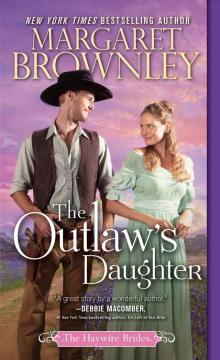 The Outlaw's Daughter
The Outlaw's Daughter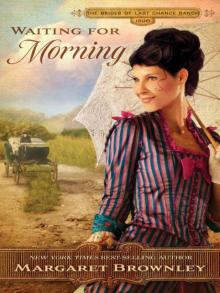 Waiting for Morning (The Brides Of Last Chance Ranch Series)
Waiting for Morning (The Brides Of Last Chance Ranch Series) Do You Hear What I Hear?
Do You Hear What I Hear?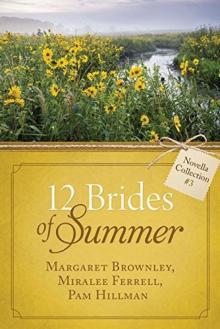 The 12 Brides of Summer Novella Collection #3
The 12 Brides of Summer Novella Collection #3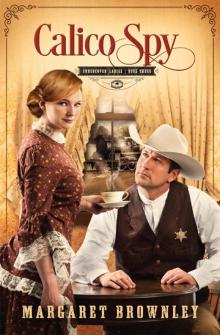 Calico Spy
Calico Spy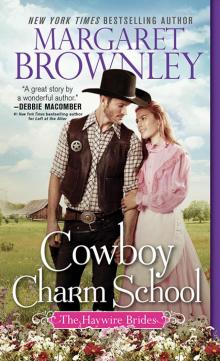 Cowboy Charm School
Cowboy Charm School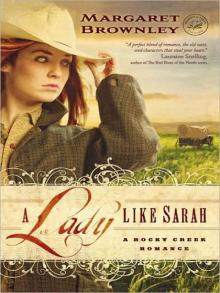 A Lady Like Sarah
A Lady Like Sarah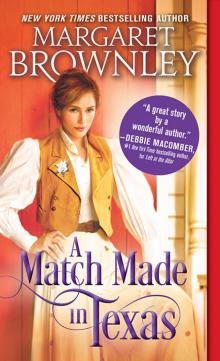 A Match Made in Texas
A Match Made in Texas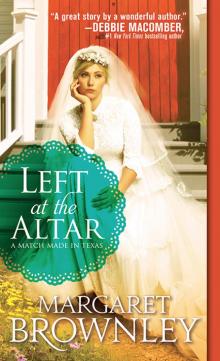 Left at the Altar
Left at the Altar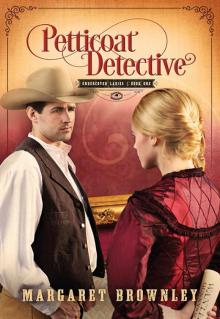 Petticoat Detective
Petticoat Detective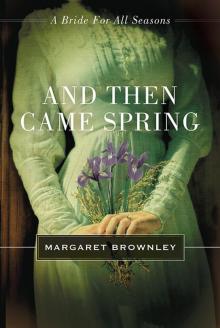 And Then Came Spring
And Then Came Spring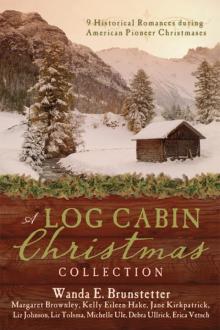 Log Cabin Christmas
Log Cabin Christmas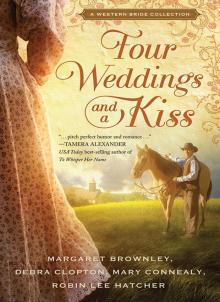 Four Weddings and a Kiss
Four Weddings and a Kiss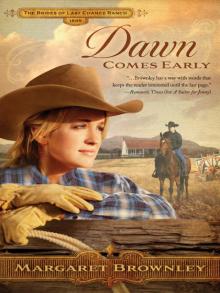 Dawn Comes Early
Dawn Comes Early